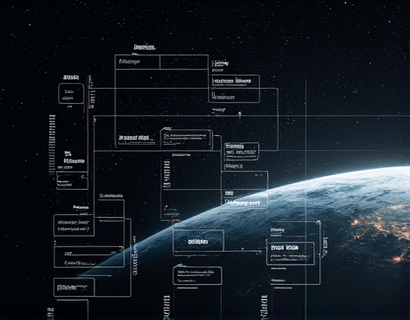Real-Time Government Data: Empowering Citizens and Enhancing Civic Participation Through Open Access and Accountability
The advent of real-time government data access represents a pivotal shift in the way democracies function, offering unprecedented opportunities for citizen engagement and governmental accountability. This transformation is rooted in the principles of open data, which advocate for the free and open availability of information held by the government. By making government data accessible in real-time, authorities can foster a more informed and active citizenry, thereby strengthening the democratic process.
Open data initiatives have gained momentum globally, with numerous governments recognizing the potential benefits of transparency and accessibility. These benefits extend beyond mere compliance with transparency mandates; they fundamentally alter the dynamics of governance, enabling citizens to monitor, analyze, and influence public policy more effectively. This article delves into the multifaceted impact of real-time government data, exploring how it empowers citizens and enhances civic participation.
The Role of Open Data in Governance
Open data in governance refers to the practice of making government-held data freely available to the public without restrictions. This data encompasses a wide range of information, from budget allocations and public spending to environmental metrics and health statistics. The core idea is to break down information silos within government agencies, allowing citizens and organizations to access and utilize this data for various purposes.
The implementation of open data policies has been driven by a recognition that government data is a public resource. By making this data accessible, governments can promote innovation, foster economic growth, and enhance public trust. Real-time data takes this a step further by ensuring that the information is current and relevant, allowing for immediate analysis and response.
Empowering Citizens Through Access to Information
One of the most significant impacts of real-time government data is the empowerment of citizens. With access to timely and accurate information, individuals can make informed decisions about their communities and engage more effectively in the democratic process. This empowerment is particularly crucial in areas such as budget oversight, where citizens can track how public funds are being spent and hold officials accountable.
For instance, real-time budget data allows citizens to monitor expenditure patterns, identify areas of overspending, and propose more efficient allocation of resources. This level of transparency not only enhances fiscal responsibility but also builds trust between the government and its citizens. When people see that their tax dollars are being used effectively, they are more likely to support government initiatives and participate in civic activities.
Enhancing Civic Participation
Real-time government data serves as a powerful tool for enhancing civic participation. By providing up-to-date information, citizens can engage in more meaningful and informed discussions about public issues. This, in turn, fosters a culture of active citizenship where individuals feel motivated to contribute to the decision-making process.
One notable example is the use of real-time data in community planning and development. Local governments can publish data on urban development projects, public transportation schedules, and environmental impact assessments. Citizens can access this information to voice their opinions, suggest improvements, and collaborate with authorities to create better communities. This collaborative approach not only improves the quality of public services but also strengthens the social fabric of communities.
Promoting Transparency and Accountability
Transparency and accountability are cornerstones of a healthy democracy, and real-time government data plays a crucial role in achieving these goals. By making government operations more transparent, citizens can better understand how decisions are made and how resources are allocated. This transparency acts as a check on power, reducing the potential for corruption and mismanagement.
Real-time data also facilitates greater accountability. When government actions and decisions are documented and made available to the public, officials are more likely to act in the best interest of their constituents. The fear of public scrutiny acts as a deterrent against unethical behavior, ensuring that public servants remain responsive and responsible.
Technological Enablers of Open Data
The realization of open data initiatives relies heavily on advanced technological platforms. Modern governments have adopted various tools and technologies to collect, process, and disseminate data in real-time. These platforms often include data portals, APIs, and interactive dashboards that make it easy for citizens to access and analyze government data.
Data portals serve as central hubs where citizens can find a wide range of government information. These portals are designed to be user-friendly, allowing individuals to search and download data with minimal effort. APIs (Application Programming Interfaces) enable developers to integrate government data into third-party applications, fostering innovation and new services. Interactive dashboards provide visual representations of data, making complex information more accessible and understandable.
Case Studies: Successful Real-Time Data Initiatives
Several governments around the world have successfully implemented real-time data initiatives, demonstrating the positive impact on civic engagement and governance. One notable example is the city of Barcelona, which has embraced open data to improve urban management and citizen services.
Barcelona's Open Data platform provides access to a vast array of city data, including transportation, environmental monitoring, and public services. Citizens can use this data to report issues such as potholes or street lighting failures directly to the city government. This not only improves the responsiveness of municipal services but also fosters a sense of ownership and involvement among residents.
Another example is the United States, where the Data.gov platform has become a model for open government data. Launched in 2009, Data.gov offers a comprehensive repository of federal data, covering areas such as health, education, and environmental data. The platform has spurred numerous innovative applications and services, from health tracking apps to educational tools for students.
Challenges and Considerations
While the benefits of real-time government data are clear, there are also challenges and considerations that need to be addressed. One major concern is data privacy and security. Governments must ensure that sensitive information is protected and that personal data is not misused. Implementing robust data protection measures and adhering to privacy regulations are essential to maintaining public trust.
Another challenge is the digital divide, where not all citizens have equal access to technology and the internet. To maximize the impact of open data, governments must work to bridge this gap by providing public access points and digital literacy programs. This ensures that the benefits of open data are accessible to all segments of society.
The Future of Open Data in Governance
As technology continues to evolve, the potential for real-time government data to transform governance is immense. The integration of artificial intelligence and machine learning can enhance data analysis, providing deeper insights and predictive capabilities. This can help governments anticipate and address issues proactively, further improving public services and citizen satisfaction.
Moreover, the global movement towards open data is gaining momentum, with international organizations and networks supporting the sharing of best practices and standards. This collaboration can lead to more consistent and effective open data initiatives worldwide, creating a more transparent and participatory global governance model.
In conclusion, real-time government data is a powerful tool for empowering citizens and enhancing civic participation. By making government information accessible and transparent, authorities can build trust, promote accountability, and foster a more engaged and active citizenry. Embracing open data is not just a matter of compliance but a strategic investment in the health and sustainability of democratic societies.










































